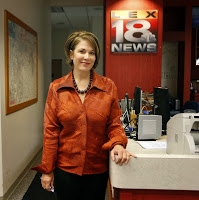Lexington TV reporter was moved to donate a kidney to a still-unknown stranger and hopes her story will encourage others

have one,” reports Valarie Honeycutt Spears of the Lexington Herald-Leader.
 Searcy, a fixture on WLEX-TV, told Spears that she had not considered donating a kidney until she reported a story about the family of a man who needed a kidney. What inspired her about this family was that it reminded her of her own: young, with two children. The man followed a regimented kidney dialysis schedule and strict diet that dictated his daily routine, but what he really needed was a kidney.
Searcy, a fixture on WLEX-TV, told Spears that she had not considered donating a kidney until she reported a story about the family of a man who needed a kidney. What inspired her about this family was that it reminded her of her own: young, with two children. The man followed a regimented kidney dialysis schedule and strict diet that dictated his daily routine, but what he really needed was a kidney.
“It’s hard to
explain,” Searcy told Spears. “But I left that home thinking, ‘I’m going to get
tested to see if I’m a match for him.'”
She was not a match for that man, but he eventually got one as a result of her story, and she continued with
further testing to see if she would match with someone else who needed a kidney.
Eventually, she was found to be a match for a would-be recipient. Searcy still does not know who the recipient was, but told Spears it was a woman “whom I’m told is doing very well and I’m happy for her.” Searcy’s surgery took place Aug. 29 and the recipient, who was in the same hospital, received the kidney almost immediately, reports Spears.
Searcy, told University of Kentucky Chandler Hospital officials that she would like to meet the recipient if the woman is willing but understands if it never takes place, Spears reports. “If I don’t, I just hope my kidney is doing its job for her … I just really hope it continues to work for her,” Searcy said.
Stephen Strup, the James F. Glenn Professor and chief of urology in UK’s College of Medicine, told Spears that it’s unusual for
someone to donate a kidney without having some knowledge of the
recipient.
He said Searcy went into the donation with “eyes wide open and really thought about
it and felt like it was something she was called to do,” he said.
“I was healthy, had healthy children and most
importantly, had no family history of kidney problems. Why not help
someone if I can? It was a very matter-of-fact decision for me,” she told Spears. “I considered the risks. My father pointed out more than once the fact I have two young kids; what if something happened?” Strup, the physician, told Spears, “Life with one kidney is really no different than life with two.”
Searcy’s husband, Versailles policeman Heath Dotson, told Spears that he decided that it was his wife’s
decision. “From the beginning, I didn’t try to talk her
out of it,” he said. “I was
very proud of her.”
Lynne Polly, a donor coordinator at the hospital, told Spears that about 365 people are waiting to get a kidney there. “This year there were about 20 living donors and 70 deceased donors,” Spears writes. “Of the living donors in 2013, only Searcy and one other donor did not know the recipient.”
Searcy told Spears the surgery had not affected her lifestyle, and that she is not aware of the missing kidney. A month of the surgery, she was running again, back to her normal routine and had no diet restrictions.
She told Spears that she agreed to share her story with the Herald-Leader because she wants others to consider becoming living donors. “The more people realize how far transplants have come,” Searcy said, “the more people will be open to getting tested.” (Read moreore)
Want to help?
Contact Lynne Polly at (859) 323-5737 or lynne.polly@uky.edu.
For more information about being a living donor, visit UKhealthcare.uky.edu/trans.